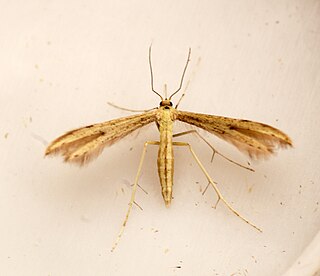
Adaina microdactyla is a moth of the family Pterophoridae first described by Jacob Hübner in 1813. Also known as the hemp-agrimony plume, it is found in Africa, Asia and Europe.
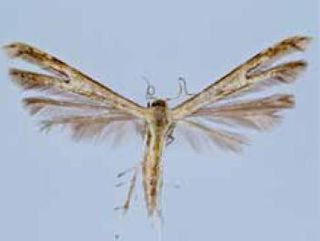
Adaina is a genus of moths in the family Pterophoridae. The genus was erected in 1905 by J. W. Tutt. Several of its species have gall-inducing larvae, such as Adaina primulacea, of which the larvae induce stem galls on Chromolaena odorata, and Adaina microdactyla, which induces stem galls on Eupatorium cannabinum.

Adaina bipunctatus is a moth of the family Pterophoridae. It is found in the United States, including Florida and Mississippi. It has also been recorded from Trinidad, the West Indies, Brazil and Ecuador.
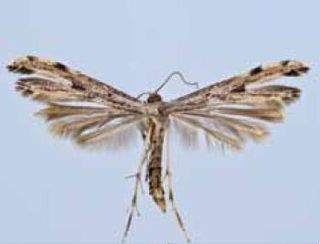
Adaina ambrosiae is a moth of the family Pterophoridae. It is found in North America from California east to Florida and north to Ontario. It is also known from Bermuda, Costa Rica, Jamaica, Puerto Rico and the Virgin Islands.
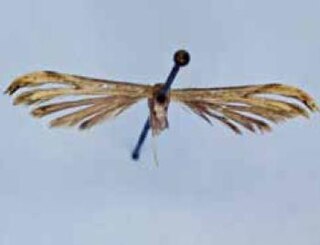
Emmelina buscki is a moth of the family Pterophoridae first described by William Barnes and Arthur Ward Lindsey in 1921. It is found in North America.
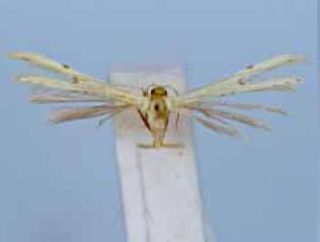
Adaina simplicius is a moth of the family Pterophoridae. It is found in the United States, Brazil, Costa Rica, Ecuador, Paraguay and Puerto Rico. It was introduced to South Africa for study as a biological control agent for Eupatorium macrocephalum.
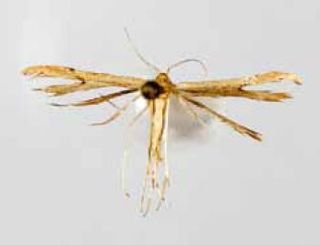
Adaina zephyria is a moth of the family Pterophoridae first described by William Barnes and Arthur Ward Lindsey in 1921. It is found in the United States (California), Mexico (Oaxaca), Peru (Huanaca), Venezuela, Bolivia, Costa Rica and Ecuador.

Adaina thomae is a moth of the family Pterophoridae. It is found in Saint Thomas, Brazil, Hispaniola Mexico and Puerto Rico.
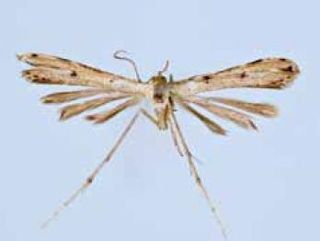
Adaina perplexus is a moth of the family Pterophoridae. It is found in the United States, including the Florida Everglades. It has also been recorded from Cuba and Trinidad.

Adaina beckeri is a moth of the family Pterophoridae. It is found in Costa Rica and Belize.
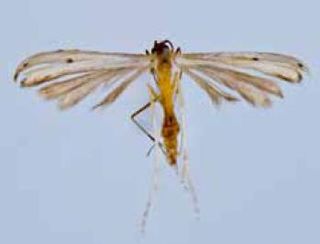
Adaina hodias is a moth of the family Pterophoridae. It is found in Brazil, Costa Rica, Venezuela (Mérida), Ecuador and Mexico.

Adaina fuscahodias is a moth of the family Pterophoridae. It is found in Mexico (Veracruz), Brazil and Costa Rica.

Adaina bernardi is a moth of the family Pterophoridae. It is found in Costa Rica and Mexico.

Adaina planaltina is a moth of the family Pterophoridae. It is found in the Federal District of Brazil.

Adaina invida is a moth of the family Pterophoridae. It is found in Brazil, Costa Rica and Panama.
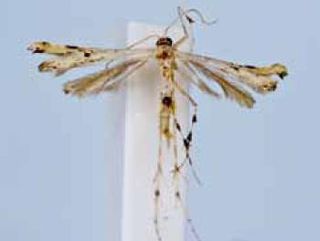
Adaina parainvida is a moth of the family Pterophoridae. It is found in Costa Rica and on Jamaica.

Adaina everdinae is a moth of the family Pterophoridae. It is found in Salta Province, Argentina.

Adaina obscura is a moth of the family Pterophoridae. It is found in Costa Rica.
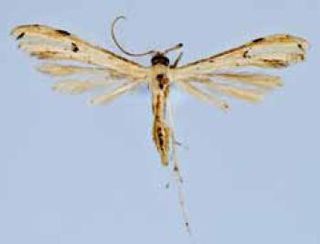
Adaina ipomoeae is a moth of the family Pterophoridae. It is found in Cuba, Jamaica, Puerto Rico, Guadeloupe, the Dominican Republic, Grenada, and Florida.
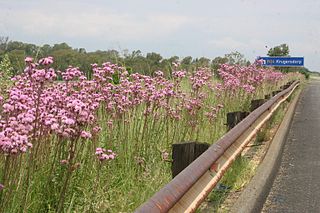
Eupatorium macrocephalum Less. aka pompom weed, is a cosmopolitan perennial plant belonging to the family of Asteraceae and regarded as an invasive weed in some countries. It is native to the southern United States, Central America, South America and was introduced to South Africa. It is classed as a principal weed in Brazil. In South Africa it has been cultivated as an ornamental, is often found on roadsides, and has become of concern for its invading of undisturbed climax grassland and wetlands since the 1960s. It is closely related to Siam weed, and is one of some 268 species in the genus.




















